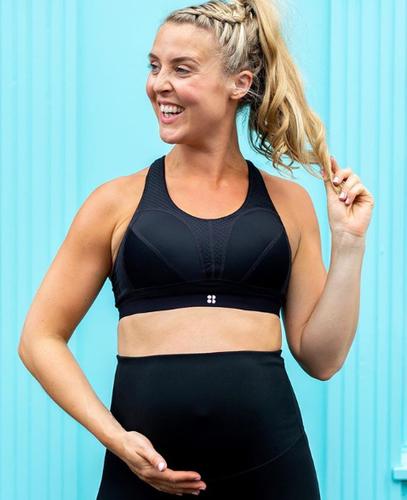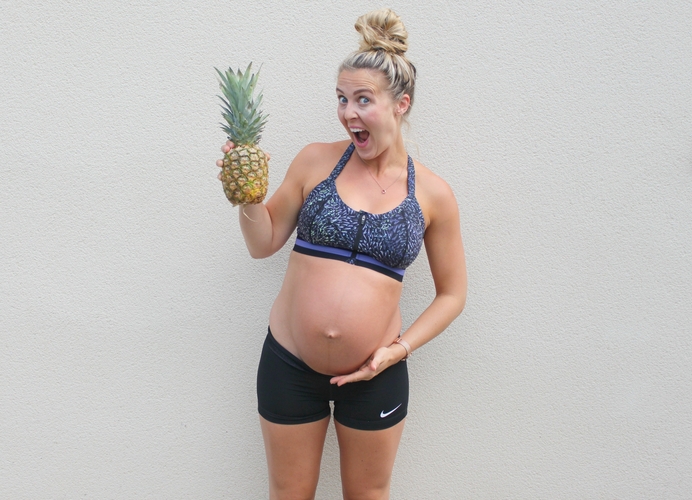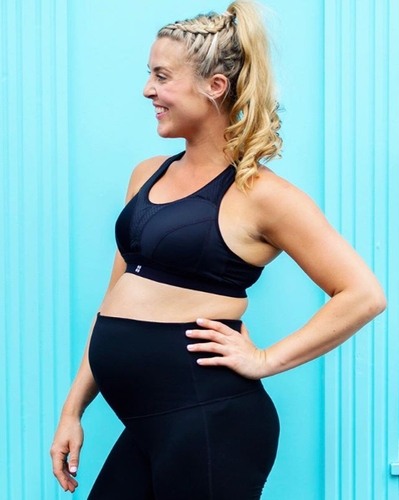Six weeks after giving birth, PT Hannah Mills highlights the pressures on women post pregnancy
The media is obsessed with women’s bodies.
From the tacky headlines that fat-shame celebs on the beach to the features that focus heavily on body shape trends, the way women look is a popular topic of discussion. And whilst body positive influencers have helped to shape a healthier discourse around how women’s bodies should look (spoiler alert: however said woman wants them to look), aesthetic pressures are still rife.
Hannah Mills, a Personal Trainer and Pre & Post Natal Specialist with thousands of followers tuning in to see her workout tips, is aware of said pressures. But, six weeks after giving birth to her first child, the PT has chosen to take a different approach to sharing her post-pregnancy life.
“I think any woman – whether it’s a celebrity or an influencer or even a woman that you see down the street – has the responsibility to keep it real. Instagram stories are great for showing the behind the squares of life with a baby.”
Instead of sugar-coated snaps of mum and baby in floral fields, Mills shares a very down-to-earth account of life with a new born, posing in no makeup whilst breastfeeding after little sleep and no time to get ready.
“It’s easy to find pictures of unrealistic accounts of what post-pregnancy life can be like and then to sit there in your pyjamas covered in baby sick and look down on yourself. [But] Don’t be fooled by what you see on social media.”
For Personal Trainers and fitness influencers who make a living out of engaging clients in health and fitness, personal physique can be an important marketing factor. But for Mills, her pregnancy has changed both her body and outlook.
“The changes to my body that I’ve experienced during my pregnancy have shifted my relationship with my body forever for the better. I’m grateful to have gone through the experience. The respect that I have for my body is greater than I’ve ever had before. It doesn’t matter that my abs aren’t chiselled or that my back isn’t as defined.”
“Before my pregnancy, there would be days where I’d look in the mirror and think that I’m not lean enough. But now I’m so in awe of my body – and any female body. The fact that we can grow a human being in our bodies… I’m still getting my head around it. We’re so much more than what you see on the outside.”
From posts of perfectly flat tummies on social media to profiles of celebs who miraculously ‘bounce back’ post pregnancy, the pressures on women to lose their baby weight after pregnancy have long been known in the media. But, thanks to the likes of open accounts about post-baby bodies from public figures including Chrissy Teigen and fitness influencer Emily Skye, things are changing. Mills too believes that attitudes are changing.
“I don’t believe that [our bodies] ‘go back’ once you’ve had a baby. I think they evolve. Your body has been through nine months of growing another person, so it changes. For me, it’s about embracing the new body that you have.”
“Every woman is different. Every pregnancy, child birth and post-partum period is different. I always say to my clients that it has taken your body nine months to adapt and grow a human, so we should allow at least the same amount of time for your body to adjust to life after a baby. But there’s no set timeframe. It’s about embracing your new body and feeling good about yourself.”
Mills worked out throughout her pregnancy, to the surprise of some gym members.
“I was keen to stay active throughout pregnancy with weights resistance and training, though my workouts were adaptations of course. Swimming allowed me to workout whilst feeling weightless – which is great in the third trimester. There were some people that were surprised to see me in the gym – mainly because I had a big bump – but the response overall was positive from men and women.”
“More and more women are seeing the benefits of staying active whilst pregnant.”
Now, the Personal Trainer has created a fitness plan for expecting mums to maintain healthy exercise and fitness levels during pregnancy.
If there’s no complications and both the GP and midwife have given their approval, then resistance training during pregnancy can be very beneficial when performed under the supervision of a pre and post-natal specialist. Mills recommends always seeking professional guidance to ensure workouts are safe.
The NHS recommends workouts during pregnancy including stomach-strengthening and pelvic floor exercises.
“For me, working out has always been about making myself feel good. It’s not so much about the fitness goals.”







